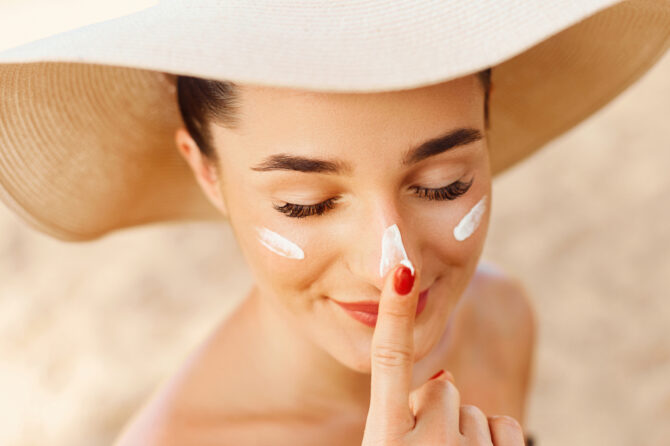
5 must standards to choose the best sunscreen!
Sunscreen is one of the indispensable products in your daily life, as it is considered the shield that protects the skin from all the ultraviolet rays effects such as pigmentation, burns, and accelerated signs of aging. When you visit Skin Expert Clinic (Beirut, Lebanon), the dermatologist and cosmetologist, Dr. Yassine, applies sunscreen, whether as part of your daily routine or after applying any cosmetic procedure that requires it.
With so many options available in this field, you might feel lost about the best option. Therefore, we reveal to you the criteria that you must take into consideration to choose the most successful option and to provide full protection for your skin.
1- Protection from all types of ultraviolet rays:
What you should know is that 3 types of ultraviolet rays differ in length and effect.
We start with the short rays (UVC), which do not reach the ground, but are repelled by the ozone layer, and therefore have no direct effect on the skin. While the long-range rays (UVA) remain strong and present throughout the year, and are responsible for the aging of the skin, changing its color and losing its elasticity. These rays can penetrate the clouds, the glass, and the surface layers of the skin causing tough damage to it. Down to the medium-range rays (UVB), which are more intense during the summer, and are responsible for sunburn and cancerous swellings. These rays do not penetrate the skin as deeply as the long ones do, but they are equally dangerous.
So, as you can see, you need a sunscreen that protects you from long- and medium-range rays, and to make sure of that, you should find the sentence “Broad Spectrum” on the sunscreen, which means that it covers a wide spectrum of ultraviolet rays. In Skin Expert Clinic of Dr. Yassine, you will find sunscreens that provide professional protection from all UV rays.
2- Free from allergens:
to ensure that the sunscreen you use is safe, it must be free of any harmful or allergens. For example, PABA (para-aminobenzoic acid) can cause allergic reactions and perfumes as well.
3- The degree of protection factor (SPF):
The number written on the sunscreen often attracts you, which varies greatly from one product to another (15-20-30 and 50). This number represents the degree of sun protection factor or SPF, and of course, the higher the protection number, the greater the protection against the effects of harmful ultraviolet rays. Dr. Yassine always makes sure to choose the best sunscreen with SPF 50 available at his Skin Expert Clinic (Beirut, Lebanon).
4- Appropriate skin type:
The fourth criterion that we draw your attention to is the suitability of the sunscreen to the type of skin, especially if it is of an oily or sensitive type, in order to avoid any unwanted reactions such as redness or increased oily and greasy secretions. So, check the types that the sunscreen fits in because the formulas varies and can fit more than one type. There is no doubt that the specialist in dermatology and cosmetology, Dr. Yassine, will guide you to the best sunscreen to adopt, regardless of your skin type, especially the oily type that requires a product that reduces oily secretions and helps mattify the skin.
5- Choosing the right type of filter:
After you got acquainted with a lot of important information about sunscreen, we also draw your attention to the fact that there are 3 types of filters approved among sunscreens to protect against UV rays:
- Mineral Filters: These filters are applied on the surface of the skin to repel harmful rays as a protective shield. It is suitable for different skin types but is considered the best for sensitive skin or that has undergone any procedures that require additional protection, in addition to the skin of children over 6 months of age.
- Chemical filters (Organic / Chemical Filters): Chemical filters absorb harmful rays and prevent them from being absorbed by the skin. It suits all skin types and is preferred for skin with darker tones. What distinguishes it is that it is quickly absorbed by the skin and is water-resistant.
- Filters that combine the two types (Blended Filters): Some sunscreens combine the two mentioned types, thus providing additional benefits such as moisturization, water resistance, and long-term wear on the skin.
Now that you have discovered with us all this information about sunscreen, there is no doubt that your choice will be better and suitable for your skin type and needs. But what we would like to draw your attention to finally, is the need to cover the whole body and face with sunscreen to obtain the desired protection, and apply so every two hours, especially when you spend your day outside.
Leave a reply